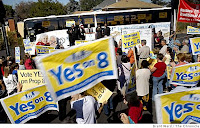 Yesterday I explored the issue of intolerance and LGBT people’s actions with respect to the passage of California Prop 8. It only seems natural to look at intolerance of Prop 8 Christian supporters since that is the group that LGBT people target as intolerant. As you can see, intolerance is tossed around a lot when discussing LGBT issues and rights.
Yesterday I explored the issue of intolerance and LGBT people’s actions with respect to the passage of California Prop 8. It only seems natural to look at intolerance of Prop 8 Christian supporters since that is the group that LGBT people target as intolerant. As you can see, intolerance is tossed around a lot when discussing LGBT issues and rights.
As a person who attends and advocates for LGBT inclusion in the Church at local and national church gatherings, I have witnessed episodes of intolerance in these secular gatherings. They are generally not so blatant but more subtle. Christians who belong to the mainstream denominations such as Lutherans, Methodists, Episcopalians and Presbyterians tend to be more private when it comes to issues surrounding their faith. Intolerance is usually manifested in outbursts or spontaneous statements when debating issues. The important thing to note about this is that these actions hurt the person’s cause and helps the opposing cause as they become seen as unreasonable and in a negative light.
I do not like the label of “hate” and do not believe it should be applied to people who cast a vote against LGBT resolutions and memorials at church assemblies. Analyzing these individuals over the past 10 years has lead me to believe that these votes are based primarily on fear of the unknown and the desire for Christian unity. The Church is in a time of declining membership and financial resources (as are most non-profits and community based organizations). A change in policy that threatens to impact membership and financial giving has a difficult time of gaining approval. I have seen a single speaker stand at a microphone and play the fear card and turn the debate and vote in a completely different direction. Failure of pro-LGBT resolutions and memorials are more about these “reality” issues than about theological issues.
The basic question posed in this post is “Are Christians intolerant of LGBT people?” Depends. That’s my simple answer. I believe Christian denominations have the right to debate, vote and legislate on their policies and practices according to the denominations governing documents. It’s the fundamental way in which most Christian bodies come to common understanding in a community of faith. If the votes are not on the side of pro-LGBT resolutions and memorials, then that is where the denomination stands at that point in time. Time changes as do minds. A future avenue may open where the vote may swing the other way. I never see these votes as ultimatums where the vote happens once and it is the “law” for eternity.
On the flip side of my “depends”… I do believe that Christians can be intolerant of LGBT people in areas outside of but related to the Church. The Prop 8 ballot initiative is a prime example of this. Many religious leaders and denominations supported the LGBT community in their campaign to defeat Prop 8. However, many denominations and Christians worked hard for its passage. That’s life in a democracy. We don’t always agree on what is right.
If you look at some of the pro-Prop 8 ad campaigns, you see a definite influence from the Christian community. The theme of fear of the unknown and call for Christian unity rang clear in the ads. It was not a campaign about the issue at hand but rather a campaign to deny rights using fear and half truths as the main vehicle to make the point. The undercurrent of the ads is what I take issue with: equating secular marriage to civil marriage. As a strong believer in the separation of Church and State, these individuals crossed the line to impose their religious beliefs about secular marriage to the civil right of marriage. The two are vastly different; more about that later this week.
My bottom line in this post is that many Christians are intolerant of LGBT people. Again, that is no big revelation. I base my assertion on the premise that intolerance can be charted on a scale of 1 (very tolerant) to 10 (very intolerant). The majority of the people cluster around the center with smaller camps clustered at the extremes. What happened in California was that the “10s” whipped up a campaign of fear and was able to persuade a majority of voters to side with them.
I know many Christians believe that their faith calls them to act on ballot initiatives. I would ask them to consider what impact their actions have on healthy, happy LGBT families. No one won with the passage of Prop 8. I would argue that the Bible does not support this type of activism when it violates the basic principles of love, faith and compassion that are central theme in the Bible.
